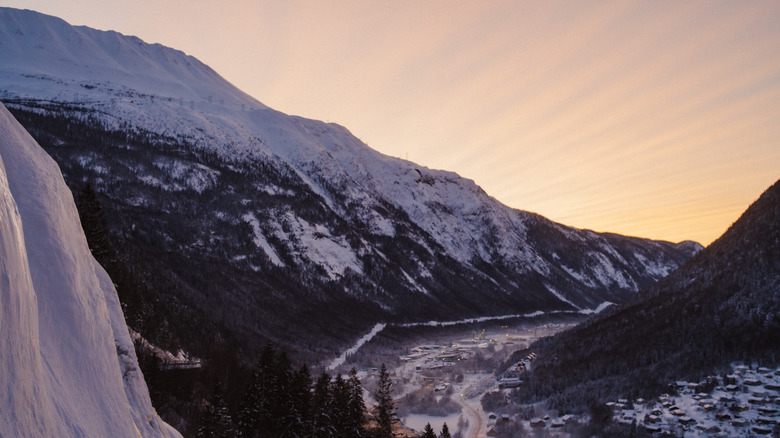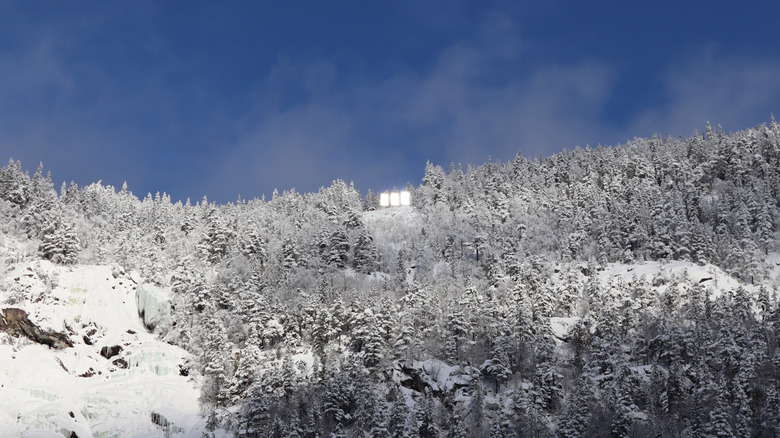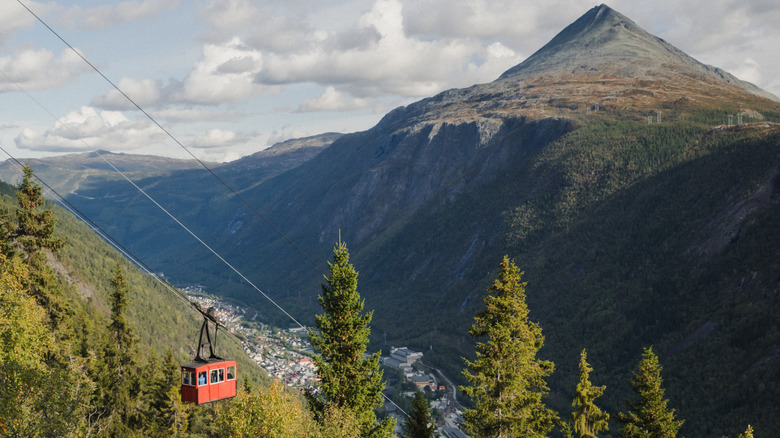Norway's Underrated Alpine Valley Village Is A Recreational Mountain Getaway That Goes Months Without Sunlight
Some places in the world experience extra-long days in summer, like Fairbanks, Alaska, nicknamed the "land of the midnight sun," as the sky is illuminated by natural light in the middle of the night. The opposite phenomenon, the so-called "polar night," also occurs in parts of the Arctic and Antarctic circles. One notable destination with long, cold winters and minimal sunlight is the alpine village of Rjukan, Norway.
Just over 100 miles east of Oslo at the base of the deep Vestfjorddalen valley, midway between the lakes of Møsvatn and Tinnsjå, and ringed by tall mountains, the town doesn't see direct sun for about half of the calendar year. While not a problem for winter sports enthusiasts — the village's ski center offers well-illuminated slopes for night skiing and has similar infrastructure for other recreational activities — Rjukan residents have also come up with creative methods for harnessing the power of the sun throughout the year. Planning a trip to the region? Don't miss the "Grand Canyon of Norway," a jewel-like fjord with renowned views and cozy inns.
Sun mirrors in the mountains
Rjukan started out as a company town in the early 20th century. Its founder, industrialist Sam Eyde, planned on installing "sun mirrors" in the mountains to reflect natural light down into the town in winter. Though his first attempts weren't successful, Eyde did introduce other concepts, including an alpine gondola, to offer much-needed sun exposure to village residents. Nearly a century later, another Rjukan local, Martin Andersen, picked up on the sun mirror idea. The first three mirrors, solar-powered and built of steel, were put in place in 2013. They slowly rotate throughout the day, casting luminous sunshine onto the town square.
Today, you can spot the massive sun mirrors, or Solspeilet, in the mountains near town while hiking or cycling in the Hardangervidda, Norway's largest national park, a mountain paradise full of waterfalls, lakes, and endless adventure. Ride the Gaustabanen cable car to the Mount Gausta trailhead, enjoying sweeping views from the upper station. In winter, there's downhill and cross-country skiing (with lighted slopes and tracks, of course) at Gausta Ski Center. If you like the Norwegian way of life, you won't be surprised to find out which European country Rick Steves would be living in if he couldn't live in the United States.
Plan a trip to Rjukan
There are several attractive lodgings in town, including the riverside cabins at Rjukan Hytteby ($124 per night) and the bed and breakfast-style Rjukan Gjestegaard ($247 per night). Dining options range from the elegant Restaurant Admini and the casual Kro, both in town, to Gaustatoppen Turisthytte, a café with a view at the top of the funicular track.
Rjukan is about two and a half hours by car from Oslo and its international airport. The ability to drive yourself around the region is an advantage, as the same journey takes anywhere from four to ten hours using public transportation. Rental cars in Norway usually come with winter tires, which are mandatory for several months of the year. Once you're in Rjukan, you're more likely to get around on foot or by bicycle. Local outfitters like Intersport Rjukan and Gaustablikk Fjellresort offer rental bikes for exploring the region's many trails or simply pedaling around Holmevatn lake. If you're in search of other under-the-radar Scandinavian destinations, consider a trip to Åmål, Sweden's lakeside village with art, shops, and cute cafés.


